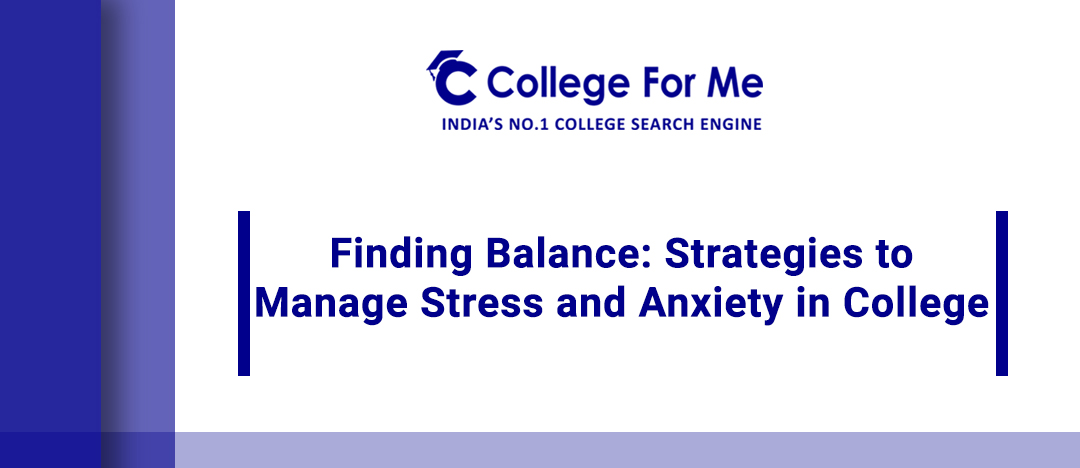Career Scopes Of A B.Tech. Student
There is a high demand for B.Tech. degree holders in the private sector, yet, there is also the opti...

College life can be an exciting and transformative experience, but it can also bring about stress and anxiety due to academic pressures, social transitions, and personal responsibilities. It is crucial for college students to develop effective coping strategies to manage these challenges and maintain their mental well-being.
In this blog post, we will explore practical tips and techniques to help college students deal with stress and anxiety, allowing them to thrive in their academic and personal pursuits.
1. Prioritize Self-Care:
- Establish a routine: Create a balanced schedule that includes dedicated time for studying, relaxation, exercise, and socializing. Maintaining a consistent routine can provide structure and reduce feelings of overwhelm.
- Get enough sleep: Aim for a regular sleep schedule and ensure you get the recommended amount of sleep each night. Sufficient rest promotes mental clarity, focus, and overall well-being.
- Eat well: Maintain a healthy diet by incorporating nutritious foods. Avoid excessive caffeine, sugary snacks, and processed foods, as they can contribute to mood swings and energy crashes.
2. Develop Effective Time Management:
- Set realistic goals: Break down your tasks and assignments into smaller, manageable goals. Prioritize them based on deadlines and importance. This approach helps avoid procrastination and reduces stress.
- Use productivity tools: Utilize time management apps, calendars, or to-do lists to keep track of your commitments and deadlines. These tools can help you stay organized and reduce the likelihood of feeling overwhelmed.
3. Seek Support:
- Connect with others: Cultivate a support network of friends, family, or classmates who can provide emotional support and understanding. Share your experiences and challenges, and don't hesitate to ask for help when needed.
- Utilize campus resources: Colleges often offer counseling services, support groups, or wellness programs. Take advantage of these resources to address any stress or anxiety you may be experiencing. Professional guidance can provide valuable coping strategies and tools.
4. Practice Stress-Relief Techniques:
- Exercise regularly: Engage in physical activities that you enjoy, such as walking, yoga, or team sports. Exercise releases endorphins reduces tension, and improves overall mood.
- Deep breathing and meditation: Incorporate deep breathing exercises and mindfulness meditation into your daily routine. These techniques help calm the mind, reduce stress, and promote relaxation.
- Find creative outlets: Explore creative activities such as painting, writing, playing a musical instrument, or dancing. These outlets provide a healthy way to express emotions and release tension.
5. Foster a Healthy Work-Life Balance:
- Take breaks: Allow yourself regular breaks during study sessions to recharge and relax. Stepping away from your work, even for a short time, can improve focus and productivity.
- Engage in hobbies and social activities: Dedicate time to activities that bring you joy and fulfillment outside of your academic responsibilities. Participate in clubs, sports, or volunteer work to foster a sense of belonging and connection.
6. Practice Self-Compassion:
- Be kind to yourself: Avoid self-criticism and negative self-talk. Treat yourself with kindness and understanding, acknowledging that everyone makes mistakes and faces challenges.
- Practice self-care rituals: Engage in activities that promote self-care and relaxation, such as taking bubble baths, practicing mindfulness, or enjoying a hobby. These rituals help you reconnect with yourself and recharge your energy.
Conclusion:
College life can be demanding, but by implementing these strategies, college students can effectively manage stress and anxiety. Prioritizing self-care, developing effective time management skills, seeking support, practicing stress-relief techniques, fostering a healthy work-life balance, and practicing self-compassion are key steps toward maintaining mental well-being. Remember, it is important to reach out for professional help if stress and anxiety become overwhelming.

There is a high demand for B.Tech. degree holders in the private sector, yet, there is also the opti...

If you are looking for a bright and prospective career, then getting a B.Tech. in CSE must be under ...
Comments (0)